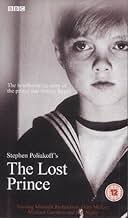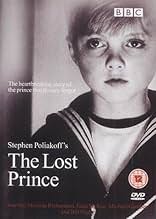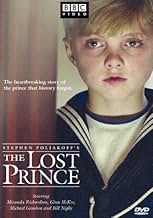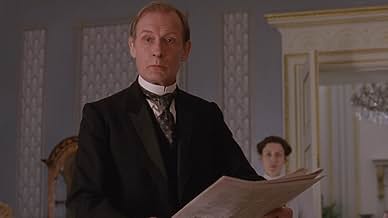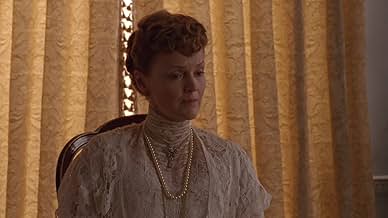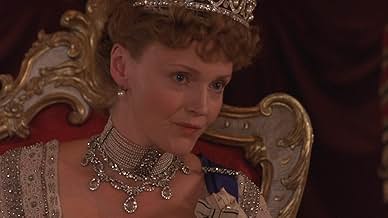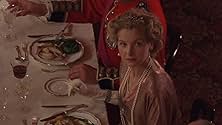VALUTAZIONE IMDb
7,6/10
2195
LA TUA VALUTAZIONE
Aggiungi una trama nella tua linguaThe story of Prince John, the autistic and epileptic youngest son of Queen Mary and King George V, who spent his whole life hidden away from public view and died at the age of 13 in 1919.The story of Prince John, the autistic and epileptic youngest son of Queen Mary and King George V, who spent his whole life hidden away from public view and died at the age of 13 in 1919.The story of Prince John, the autistic and epileptic youngest son of Queen Mary and King George V, who spent his whole life hidden away from public view and died at the age of 13 in 1919.
- Vincitore di 3 Primetime Emmy
- 8 vittorie e 21 candidature totali
Sfoglia gli episodi
Recensioni in evidenza
10kos5
The Lost Prince is one of those wonderful pieces that you rarely see. Beautiful, touching, moving, and heartbreaking are only a few words to describe it. It was informative also because I had never before known of the epileptic Prince John. I fell in love with Johnny the first time I saw him.
The acting was fantastic. I loved Lalla. Gina Mckee did an excellent job in portraying her. Miranda Richardson(Queen Mary) also did a wonderful bit of acting as the seemingly heartless Queen. I was reduced to tears at the end.
If you've never heard of the wonderful little Prince, or you'd just like to watch a different perspective on the Royal family, see the The Lost Prince, you'll be glad you did.
The acting was fantastic. I loved Lalla. Gina Mckee did an excellent job in portraying her. Miranda Richardson(Queen Mary) also did a wonderful bit of acting as the seemingly heartless Queen. I was reduced to tears at the end.
If you've never heard of the wonderful little Prince, or you'd just like to watch a different perspective on the Royal family, see the The Lost Prince, you'll be glad you did.
Prince John, youngest son of George V and Queen Mary, was handicapped by learning difficulties and the epilepsy which eventually killed him at 14. He spent most of his life hidden away on the Sandringham estate, but he was well cared for and not entirely forgotten by his family (he appeared with his brothers and sisters on a Newfoundland stamp issue). Stephen Poliakof has taken this sad story and created a wonderful tale of growing up in a royal family who, far from ruling their roost, were hidebound by convention, slaves to 'appearances' and emotionally crippled. John, however, is virtually free from all of this as his brother George remarks 'he is the happiest of us all' (or words to that effect).
John and George (later the Duke of Kent) are able to observe some notable historic personalities and moments. When their grandfather Edward VII (Michael Gambon) dies, most of Europe's royalty turn up to the funeral. George, on chatting terms with Lord Stamfordham (Bill Nighy), his father's private secretary, follows the diplomatic descent into World War I. And there is the fate of cousin Nicky, Tsar of Russia, and his family, at the hands of the Bolsheviks. We see these events from the child's viewpoint, or rather from the viewpoints of two rather different, though close, children. This gives a sort of dreamy immediacy to the story, unadorned with explanations.
While his mother Queen Mary (Miranda Richardson) is both physically and emotionally distant, John is given plenty of love and affection by his nurse Lalla (Gina McKee). Despite his disabilities he thrives under her care to an extent his parents find overwhelming.
It's hard to tell how much of the story is based on fact and how much on Poliakoff's imagination, but it scarcely matters. He has created a story which actually evokes sympathy for royalty, a major achievement in this republican age. Prince John, the royal refusenik, leading his band of retainers across the landscape, is an evocative sight.
The settings are gorgeous, though none of the real places (Sandringham, Buckingham palace) is used. The acting is all first-rate; Tom Hollander's earnest George V and Miranda Richardson's stern but not totally unfeeling Queen Mary stand out, along with the boys playing the two princes.
John and George (later the Duke of Kent) are able to observe some notable historic personalities and moments. When their grandfather Edward VII (Michael Gambon) dies, most of Europe's royalty turn up to the funeral. George, on chatting terms with Lord Stamfordham (Bill Nighy), his father's private secretary, follows the diplomatic descent into World War I. And there is the fate of cousin Nicky, Tsar of Russia, and his family, at the hands of the Bolsheviks. We see these events from the child's viewpoint, or rather from the viewpoints of two rather different, though close, children. This gives a sort of dreamy immediacy to the story, unadorned with explanations.
While his mother Queen Mary (Miranda Richardson) is both physically and emotionally distant, John is given plenty of love and affection by his nurse Lalla (Gina McKee). Despite his disabilities he thrives under her care to an extent his parents find overwhelming.
It's hard to tell how much of the story is based on fact and how much on Poliakoff's imagination, but it scarcely matters. He has created a story which actually evokes sympathy for royalty, a major achievement in this republican age. Prince John, the royal refusenik, leading his band of retainers across the landscape, is an evocative sight.
The settings are gorgeous, though none of the real places (Sandringham, Buckingham palace) is used. The acting is all first-rate; Tom Hollander's earnest George V and Miranda Richardson's stern but not totally unfeeling Queen Mary stand out, along with the boys playing the two princes.
10Alex-372
The Lost Prince is a beautiful costume drama from Stephen Poliakoff, about the young brother of prince George, who nobody wanted to talk about and who was most likely autistic and most definitely epileptic, diseases respectively unknown and misunderstood at the time.
This story is roughly told through his eyes, and describes in beautiful detail the transition of Europe from a continent ruled by related monarchs (many of them Saxe-Coburg and Gotha), until the end of this system during and after WWI. As important historical events manage to find their way into palace life (the suffragette movement, the rise of ordinary people as politicians, the telephone and the motor car), they more often seem like foreign intrusions into the world of the palace.
As this is seen through the eyes of the little boy, there is very little value judgement as to whether this system was a right or just one, and at the end you are struck with the horror of the murder of the tsarist family and their beautiful daughters, but we never see the reign of terror they themselves and their secret police visited upon Russia.
There is a very funny incident when the tsarina during a visit to what she sees as her poor cousins estates, refuses to walk any further, because she has the "wrong shoes" for walking in the grass. Later, she remarks how "close" the houses of "other people" are and you can't help conclude she was simply afraid of being killed by the proletariat. :-)
Very well acted by Miranda Richardson (Blackadder), Michael Gambon, Tom Hollander, Gina McKee as the governess Lalla but especially by the two child actors who play Johnny. They look like great kids rather than brats.
Highly recommended if you can catch this on the BBC or HBO.
This story is roughly told through his eyes, and describes in beautiful detail the transition of Europe from a continent ruled by related monarchs (many of them Saxe-Coburg and Gotha), until the end of this system during and after WWI. As important historical events manage to find their way into palace life (the suffragette movement, the rise of ordinary people as politicians, the telephone and the motor car), they more often seem like foreign intrusions into the world of the palace.
As this is seen through the eyes of the little boy, there is very little value judgement as to whether this system was a right or just one, and at the end you are struck with the horror of the murder of the tsarist family and their beautiful daughters, but we never see the reign of terror they themselves and their secret police visited upon Russia.
There is a very funny incident when the tsarina during a visit to what she sees as her poor cousins estates, refuses to walk any further, because she has the "wrong shoes" for walking in the grass. Later, she remarks how "close" the houses of "other people" are and you can't help conclude she was simply afraid of being killed by the proletariat. :-)
Very well acted by Miranda Richardson (Blackadder), Michael Gambon, Tom Hollander, Gina McKee as the governess Lalla but especially by the two child actors who play Johnny. They look like great kids rather than brats.
Highly recommended if you can catch this on the BBC or HBO.
BBC1's 'The Lost Prince' is one of the best television dramas that the channel has shown for a long time. The story of King George V's youngest son, Johnnie, the programme explores the boy's learning difficulties and his autism-related problems, as well as the horrors of war as seen through the eyes of the Royal family.
Those are the facts, but the drama is so much more than a re-telling of a royal story. Moments of poignancy, such as Johnnie's frank but heartbreaking honesty with his parents, are touching without becoming schmaltzy or obvious, and the harsh burden of the First World War on the British keeps the drama well within reality.
Good performances all around, particularly from Miranda Richardson as Queen Mary and Tom Hollander as King George, who invoke sympathy from their seemingly impassive facades. Bill Nighy is excellent as the King's adviser, Stamfordham, and the children - especially Rollo Weeks -are more than capable of carrying such a difficult and weighty subject.
Those are the facts, but the drama is so much more than a re-telling of a royal story. Moments of poignancy, such as Johnnie's frank but heartbreaking honesty with his parents, are touching without becoming schmaltzy or obvious, and the harsh burden of the First World War on the British keeps the drama well within reality.
Good performances all around, particularly from Miranda Richardson as Queen Mary and Tom Hollander as King George, who invoke sympathy from their seemingly impassive facades. Bill Nighy is excellent as the King's adviser, Stamfordham, and the children - especially Rollo Weeks -are more than capable of carrying such a difficult and weighty subject.
This is a truly wonderful production with brilliant, almost surreal touches that lift this drama about the crowd.
I would love to know if any of Prince John's drawings survived. They had, or at least the ones used for the film had a Chagal-like quality that was both very graceful and artistic and filled with insite as to the inner character of the subjects. "The Tsar Swimming" and "Fat Mary" are two example. His father wearing a crown far too big for his head is a masterpiece.
I also wonder if Prince John wasn't a savant. His drawings were exceptional and far ahead of his time and his musical ability was,(if the film properly portrayed this talent)quite remarkable.
What is wonderful about this film is the sense that John despite everything managed to form his own little community on his "Estate", surrounded by people who really did love him. I also have the feeling that he was quite a happy child most of the time.
His parents were no worse than other Royal parents and a great deal better than most.
Special mention should be made of the marvelous Bibi Anderson who played Queen Alexandra so perfectly. At the funeral she even managed to look almost exactly like the Dowager Queen.
Someone mentioned that they didn't believe that the Tsar and the Tsarina would have acted as coldly toward their relations when visiting at Cowes. Unfortunately, that's just how they acted. They did believe that they were seated higher at the table of the Rulers of the World than their cousins in England who had to make-do with smaller versions of their own vast palaces in St. Petersburg. After all the Tsar was the last Absolute Monarch in the world. He even had to approve of every marriage and every divorce. No decision could be made unless he gave his approval. His cousin George had to actually deal with a rabble of advisors and that intrusive Parliment.
The scenes of the Tsar swimming were especially out of touch with reality, just as the Tsar was out of touch with the reality of his situation.
The Russian Grand Duchesses were so dream-like in their lovely summer laces and huge flower-like hats. All of John's imagined scenerios were touched with this combination of wistfullness and joy.
I mention these things because they haven't been mentioned before and they are what I will bring with me forever. Those haunting images of the children running on the beach, the flower-hats in the flower-garden and John peeking through the rails of the balcony at the beautiful lady at the banquet who smiles and waves back at him...a small and precious moment to be treasured.
See this film and fall in love with a child that refuses to be "Lost".
I would love to know if any of Prince John's drawings survived. They had, or at least the ones used for the film had a Chagal-like quality that was both very graceful and artistic and filled with insite as to the inner character of the subjects. "The Tsar Swimming" and "Fat Mary" are two example. His father wearing a crown far too big for his head is a masterpiece.
I also wonder if Prince John wasn't a savant. His drawings were exceptional and far ahead of his time and his musical ability was,(if the film properly portrayed this talent)quite remarkable.
What is wonderful about this film is the sense that John despite everything managed to form his own little community on his "Estate", surrounded by people who really did love him. I also have the feeling that he was quite a happy child most of the time.
His parents were no worse than other Royal parents and a great deal better than most.
Special mention should be made of the marvelous Bibi Anderson who played Queen Alexandra so perfectly. At the funeral she even managed to look almost exactly like the Dowager Queen.
Someone mentioned that they didn't believe that the Tsar and the Tsarina would have acted as coldly toward their relations when visiting at Cowes. Unfortunately, that's just how they acted. They did believe that they were seated higher at the table of the Rulers of the World than their cousins in England who had to make-do with smaller versions of their own vast palaces in St. Petersburg. After all the Tsar was the last Absolute Monarch in the world. He even had to approve of every marriage and every divorce. No decision could be made unless he gave his approval. His cousin George had to actually deal with a rabble of advisors and that intrusive Parliment.
The scenes of the Tsar swimming were especially out of touch with reality, just as the Tsar was out of touch with the reality of his situation.
The Russian Grand Duchesses were so dream-like in their lovely summer laces and huge flower-like hats. All of John's imagined scenerios were touched with this combination of wistfullness and joy.
I mention these things because they haven't been mentioned before and they are what I will bring with me forever. Those haunting images of the children running on the beach, the flower-hats in the flower-garden and John peeking through the rails of the balcony at the beautiful lady at the banquet who smiles and waves back at him...a small and precious moment to be treasured.
See this film and fall in love with a child that refuses to be "Lost".
Lo sapevi?
- QuizKing George V had six children, two of whom used the name George. His second son was Prince Albert Frederick Arthur George, known to the family as Bertie, who became King George VI. He had a bad stutter that began in early childhood and lasted into adulthood. His third son, Johnnie's closest sibling in this movie, was Prince George, Duke of Kent. He grew up to live a life that was considered scandalous, and died in a plane crash in 1942.
- BlooperWhen the Romanovs are in England, Alexandra speaks English with a Russian accent. In real life, Alexandra was a German princess raised in England by her grandmother, Queen Victoria. She spoke English with a British accent.
- Citazioni
Prince George: [Speaking about Prince John] He was the only one of us who was able to be himself.
- ConnessioniFeatured in Masterpiece: The Lost Prince: Part 1 (2004)
- Colonne sonoreRondo for Glass Armonica
(uncredited)
Composed by Joseph Schmittbauer (as J.A. Schmittbauer)
(Queen Alexandra's birthday cake)
I più visti
Accedi per valutare e creare un elenco di titoli salvati per ottenere consigli personalizzati
Dettagli
- Data di uscita
- Paesi di origine
- Siti ufficiali
- Lingua
- Celebre anche come
- 失落的王子
- Luoghi delle riprese
- Black Park Country Park, Black Park Road, Wexham, Buckinghamshire, Inghilterra, Regno Unito(Russian lake, royal car)
- Aziende produttrici
- Vedi altri crediti dell’azienda su IMDbPro
Contribuisci a questa pagina
Suggerisci una modifica o aggiungi i contenuti mancanti

Divario superiore
By what name was The Lost Prince (2003) officially released in India in English?
Rispondi
